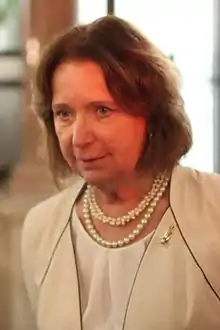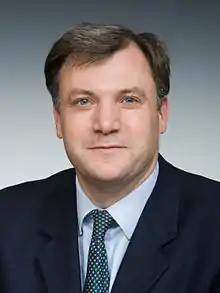Economic Secretary to the Treasury
The Economic Secretary to the Treasury is the sixth-most senior ministerial post in the UK Treasury, after the First Lord of the Treasury, the Chancellor of the Exchequer, the Chief Secretary to the Treasury, the Paymaster-General and the Financial Secretary to the Treasury. It is not a cabinet-level post.
| United Kingdom Economic Secretary to the Treasury | |
|---|---|
.svg.png.webp) Royal Arms as used by HM Government | |
| HM Treasury | |
| Appointer | Elizabeth II |
| Inaugural holder | Douglas Jay |
| Formation | December 1947 |
| Website | HM Treasury |
The office is shadowed by the Shadow Economic Secretary to the Treasury.
History
The office was created in November 1947. In 1961, the Economic Secretary became junior to the new office of Chief Secretary to the Treasury, which held a seat in cabinet.
Following the establishment of the Department of Economic Affairs in 1964, the Economic Secretary, Anthony Crosland, transferred to become Minister of State in that department. The post of Economic Secretary to the Treasury was abolished on 22 December 1964. Although the Department of Economic Affairs closed in 1969, the Treasury post was not re-established until 11 November 1981.
Since April 2014 the office of Economic Secretary to the Treasury has been held concurrently with the portfolio of 'City Minister'.[1]
Responsibilities
The Economic Secretary is responsible, though more senior ministers share in decision-making, for the answering of written and verbal parliamentary questions and for the devising of regulations, orders and legislation in various matters. These matters include banking and finance, including banks, insurance, personal savings, financial regulation, and foreign exchange reserves. He or she is also involved in taxation as it impacts on these areas, such as tax on savings and pensions, and Insurance Premium Tax. In addition, the Economic Secretary advises on economic policy and works with other Treasury ministers on the Comprehensive Spending Review and finance bills.[2]
Economic Secretaries to the Treasury, 1947–present
Colour key (for political parties):
Conservative
Labour
| Name | Portrait | Term of office | Political party | Prime Minister | Chancellor | |||
|---|---|---|---|---|---|---|---|---|
| Douglas Jay | 13 November 1947 | 23 February 1950 | Labour | Attlee | Cripps | |||
| John Edwards | February 1950 | 1951 | Labour | Gaitskell | ||||
| Office not in use | 1951–1952 | Churchill | Butler | |||||
| Reginald Maudling | 1952 | 7 April 1955 | Conservative | |||||
| Sir Edward Boyle | 1955 | 1956 | Conservative | Eden | Macmillan | |||
| Derek Walker-Smith | 1956 | 1957 | Conservative | |||||
| Nigel Birch | 1957 | 1958 | Conservative | Macmillan | Thorneycroft | |||
| Office not in use | 1958 | H-Amory | ||||||
| Frederick Erroll | 1958 | 1959 | Conservative | |||||
| Anthony Barber | 1959 | 1962 | Conservative | |||||
| Lloyd | ||||||||
| Edward du Cann | 1962 | 1963 | Conservative | Maudling | ||||
| Maurice Macmillan | 1963 | 1964 | Conservative | D-Home | ||||
| Anthony Crosland |  |
19 October 1964 | 22 December 1964 | Labour | Wilson | Callaghan | ||
| Office not in use | 1964–1981 | |||||||
| Jenkins | ||||||||
| Heath | Macleod | |||||||
| Barber | ||||||||
| Wilson | Healey | |||||||
| Callaghan | ||||||||
| Thatcher | Howe | |||||||
| Jock Bruce-Gardyne | 11 November 1981 | 1983 | Conservative | |||||
| John Moore |  |
13 June 1983 | 19 October 1983 | Conservative | Lawson | |||
| Ian Stewart | 19 October 1983 | 11 June 1987 | Conservative | |||||
| Peter Lilley |  |
11 June 1987 | 24 July 1989 | Conservative | ||||
| Richard Ryder | 24 July 1989 | 14 July 1990 | Conservative | |||||
| Major | ||||||||
| John Maples | 1990 | 9 April 1992 | Conservative | |||||
| Major | Lamont | |||||||
| Anthony Nelson | 1992 | 1995 | Conservative | |||||
| Clarke | ||||||||
| Angela Knight |  |
5 July 1995 | 1 May 1997 | Conservative | ||||
| Helen Liddell |  |
3 May 1997 | 27 July 1998 | Labour | Blair | Brown | ||
| Patricia Hewitt |  |
27 July 1998 | 17 May 1999 | Labour | ||||
| Melanie Johnson |  |
17 May 1999 | 8 June 2001 | Labour | ||||
| Ruth Kelly |  |
8 June 2001 | 15 May 2002 | Labour | ||||
| Office not in use | 2002 | |||||||
| John Healey |  |
15 December 2002 | 6 May 2005 | Labour | ||||
| Ivan Lewis |  |
May 2005 | May 2006 | Labour | ||||
| Ed Balls |  |
6 May 2006 | 28 June 2007 | Labour | ||||
| Kitty Ussher |  |
29 June 2007 | 5 October 2008 | Labour | Brown | Darling | ||
| Ian Pearson |  |
5 October 2008 | 11 May 2010 | Labour | ||||
| Justine Greening |  |
13 May 2010 | 14 October 2011 | Conservative | Cameron (Coalition) |
Osborne | ||
| Chloe Smith |  |
14 October 2011 | 4 September 2012 | Conservative | ||||
| Sajid Javid |  |
4 September 2012 | 7 October 2013 | Conservative | ||||
| Nicky Morgan |  |
7 October 2013 | 9 April 2014 | Conservative | ||||
| Andrea Leadsom |  |
9 April 2014 | 11 May 2015 | Conservative | ||||
| Harriett Baldwin |  |
11 May 2015 | 16 July 2016 | Conservative | Cameron (II) | |||
| Simon Kirby |  |
17 July 2016 | 9 June 2017 | Conservative | May (I) |
Hammond | ||
| Stephen Barclay |  |
14 June 2017 | 9 January 2018 | Conservative | May (II) | |||
| John Glen |  |
9 January 2018 | Incumbent | Conservative | ||||
| Johnson | Javid | |||||||
| Sunak | ||||||||
See also
References
- Andrea Leadsom MP appointed new City Minister for HMT, Tech UK, 10 April 2014, retrieved 4 August 2016
- Ministerial responsibilities Archived 2007-07-02 at the Wayback Machine HM Treasury
_(4953162007).jpg.webp)